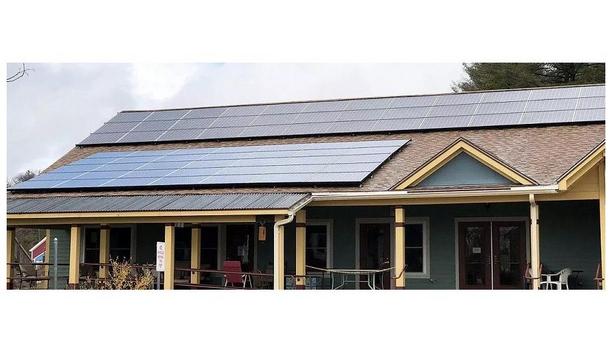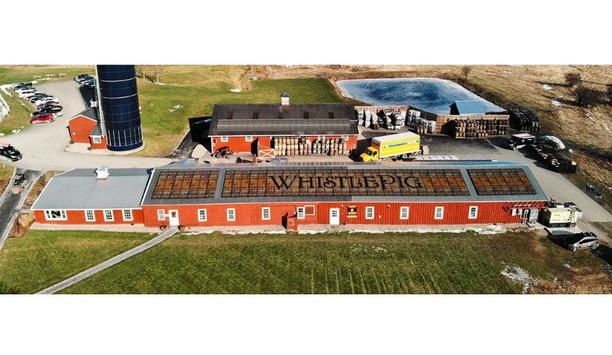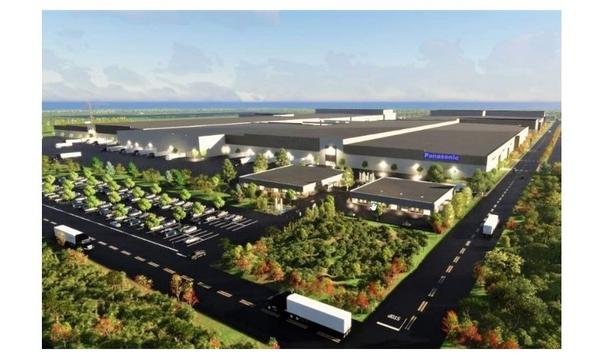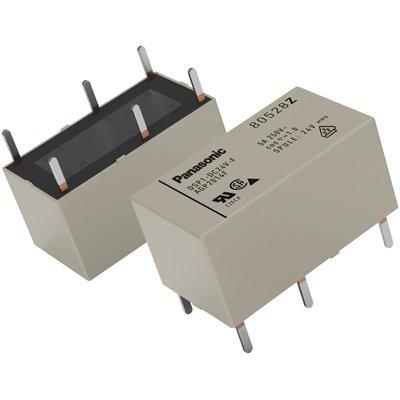Panasonic Corporation of North America - Experts & Thought Leaders
Latest Panasonic Corporation of North America news & announcements
Sometimes people lead the way to a better life. Such was the case at Mosaic Commons, a unique cohousing community located in the small rural town of Berlin, MA, 45 miles west of Boston. After seeing several residents successfully use Panasonic Elite Installer, RevoluSun, to install solar panels on their townhomes, management decided to follow suit with its own switch to solar power. Mosaic Commons Mosaic Commons is a collaborative community that “attempts to overcome the alienation of modern subdivisions where no one knows their neighbors and there is no sense of community.” Diverse, vibrant, and inclusive, their values are rooted in sharing, generosity, respect, eco-friendliness, health, and diversity, among other admirable traits. Residents even share resources like cars, lawnmowers, and tools, along with organic gardens and homegrown produce. Everyone comes together at the Common House for shared meals, games and entertainment, meetings, parties, and other activities. The Challenge The management at Mosaic Commons appreciated their residents going solar The management at Mosaic Commons appreciated their residents going solar. Since all members of the community are eco-minded, Mosaic Commons thought it would be fitting for its main gathering building to be greener, too. Because the Common House is the center of the community, physically and socially, the eco-village requested that solar panels be placed on this structure as well. LEED requirements All buildings in the village meet or surpass many LEED requirements for green buildings. Therefore, the main concern was that the Common House building had to be extremely "green”. It was also important to have a strong, reliable power source because the building is so central to the village and residents’ lifestyles. Another requirement: they wanted to use a solar manufacturer that demonstrated a history of sustainability and eco-friendly business practices. The Solution Residents and management valued Panasonic's focus on recycling and reducing the use of new materials Residents and management appreciated Panasonic's longstanding experience with solar power (over 45 years) and both companies’ track records of commitment to a sustainable world. They also valued Panasonic's focus on recycling and reducing the use of new materials. "We had a ton of fun with this project,” said Richie Bonney, RevoluSun VP of Project Development and Project Manager. “It was exciting to install solar on an eco-village that shares our core beliefs." high-efficiency renewable energy system On the Common House, RevoluSun installed a 24.75 kW solar system consisting of 75 Panasonic HIT® 330-watt panels. This high-efficiency renewable energy system more than halved the building’s utility bill, reducing its electric costs by 53%. This is in addition to the four homeowners that also went solar on their personal townhomes. The consolidated project performed by RevoluSun, and its positive impacts on carbon emissions, are shown below: The Result The installation covered four residential townhomes and the Common House, with the combined solar systems producing an average of 4,905-kilowatt hours (kWh) of electricity monthly. Compared to the same amount of power generated by a fossil fuel power plant, the positive environmental results are equal to: Equivalent greenhouse gas emissions are avoided from 103,000 miles driven by the average car. Carbon sequestered by 688 tree seedlings grown for 10 years or 54 acres of US forests for one year. "In creating and recreating our community, we intend to make decisions that are practical and ecological now and for the long term,” said a Mosaic Commons manager. “We hope to create a lasting community with well-designed and well-cared-for buildings and grounds."
For Same Sun of Vermont, it was important to deliver on their customer’s three must-haves: install a solar panel array that produces clean and efficient solar power, be aesthetically pleasing, and promote its respected brand name. Not the easiest (or most frequent) ask. But the team at Same Sun, a Panasonic premium installer, was up to the challenge. The customer, WhistlePig, is a crafter of some of the most sought-after and priciest rye whiskey on the market. In addition to a passion for distilling world-class whiskey from its picturesque 500-acre Vermont farm, WhistlePig is an eco-conscious business that takes environmental responsibility seriously. Eco-conscious business Solar panel installer: Same Sun of Vermont Customer: WhistlePig Solar products: 173 Panasonic HIT 325W modules SolarSkin wrap & design: Sistine Solar Graphic design & wrap installation: Green Screen Graphics Power production: 54,292 kWh Carbon dioxide (CO2) reduction: Approximately 814 metric tons lifetime Producing clean energy How do users use solar panels as a renewable energy source for company headquarters “The company wanted to produce clean energy but they also wanted their bottling plant and warehouse to have a dramatic looking rooftop,” explains Same Sun of Vermont founder, Philip Allen. Easier said than done. How do users use solar panels as a renewable energy source for company headquarters and a cool billboard display? Enter 18-year solar industry veteran and Same Sun Vice President, Khanti Munro. “I cherished the opportunity to get way out of my comfort zone and come up with something notably more impressive than trying to layout a ‘W’ with a handful of rectangles,” said Munro. Developing custom solution Knowing they needed an innovative idea for such a unique request, Same Sun partnered with Sistine Solar to develop a custom solution. Sistine provided a SolarSkin wrap for each module, creating the illusion of whiskey barrels with the company’s name on the rooftop. Sistine provided a SolarSkin wrap for each module, creating the illusion of whiskey barrels The only downside of the eye-catching visual display is the approximate 20% loss in kWh production due to the covering on the panels. For this reason, it was crucial to start off with a solar panel of the highest long-term efficiency. “The best way to mitigate the absorption loss from the skins was to use Panasonic HIT modules,” Allen says. “We knew these high efficiency modules coupled with their exceptional production under dramatic temperature changes – like a metal roof in Vermont - would maximize the array’s potential.” Greenhouse gas reduction Using 173 HIT® 325-watt modules, the finished product exceeded their expectations. The stunning visual WhistlePig was looking for was as bold as it was beautiful. The Same Sun installation crew succeeded in not only getting 100-foot-long rows of modules straight and square on a metal barn roof, but also spelling something in the process. “Using Panasonic modules, the squarest rectangles we’ve installed to date, definitely helped.” Munro said. More importantly, the array will produce 4,500 kWh of solar energy every month, about five times more than the average monthly usage of an American home. Even better news for the environment is the equivalent greenhouse gas reduction of over 90,000 gallons of gasoline consumed. “It’s counter-intuitive to sell something for more that produces a little less,” says Munro. “But in today’s climate crisis, what is the value of getting a well-respected global company to go solar that likely never would have otherwise?”
Panasonic Energy Co., Ltd., a Panasonic Group company, began construction on a new lithium-ion battery manufacturing facility in De Soto, KS, following the approval of the Panasonic Holdings Corporation Board of Directors. The project will drive significant economic activity and opportunities for the local Kansas economy making the state a key player in the domestic electric vehicle (EV) industry. Mass production of li-ion batteries Facility construction is focused on rapidly ramping up the manufacture of "2170" cylindrical Li-ion batteries to meet surging domestic EV battery demand. Panasonic Energy plans to begin mass production in Kansas by March 2025. Upon completion of the facility, it will maintain an annual total production capacity of approximately 30 GWh to supply EV manufacturers across the United States. Capacity expansion This groundbreaking in Kansas is a step towards expanding our production capacity in North America" “This groundbreaking in Kansas is an important step towards expanding our production capacity in North America to meet the rapidly growing demand for lithium-ion batteries,” said Kazuo Tadanobu, President, and CEO of Panasonic Energy Co., Ltd. “With our leading technology, proven expertise, and the state of Kansas as a critical partner, we will continue driving the industry forward while pursuing a more prosperous and sustainable future for our society.” revolutionizing global transportation The facility will be located at the Astra Enterprise Park site and will once again make the location a key economic driver for the region. Two contractors from the local Kansas City area, Emery Sapp & Sons Inc., and Kissick Construction Co. Inc. have been awarded contracts for site preparation, with Panasonic Energy expecting to onboard additional firms in the coming months. “The Kansas City region, just as it has over the past century, is cementing its rightful place as a leader where transit innovation is occurring," said Tim Cowden, president, and CEO of the Kansas City Area Development Council. "We are incredibly proud to stand shoulder-to-shoulder with Panasonic as they revolutionize the global transportation industry from the center of the most dynamic economy in the world." Recruitment Kansas’s skilled manufacturing workforce and reliable infrastructure make it an ideal location for this facility Kansas’s skilled manufacturing workforce, reliable infrastructure, and central location in North America make it an ideal location for this facility. The facility is expected to create up to 4,000 jobs. Recruitment for the first positions is expected to begin in mid-2023 and individuals interested in applying can visit the Panasonic website. new career opportunities “Panasonic deeply values the strong relationships we build with the local communities where we live and work,” said Megan Myungwon Lee, Chairwoman, and CEO of Panasonic Corporation of North America. “This factory will open new career opportunities for De Soto residents in one of the most exciting industries in our modern economy." "We hope it will also serve as a source of inspiration for the community’s young people, who will become the innovators creating a more vibrant and sustainable future, and we are committed to helping them achieve their goals.” Donations for educational opportunities Panasonic has a long track record of supporting the communities where it operates, including investing in local education, talent development, mentorship, volunteerism, and environmental initiatives. As a first step in the company’s new commitment to Kansas and the De Soto community, Panasonic is making a $25,000 donation to Unified School District No. 232 to support educational opportunities for students. renewable energy investment De Soto has been planning for this growth and the return of advanced manufacturing jobs" "The City of De Soto is thrilled to work with Panasonic and welcome them to our amazing community," said Mayor Rick Walker. "De Soto has a rich history of supporting critical manufacturing facilities and we have been planning for this growth and the return of advanced manufacturing jobs to this area for years. We're especially excited for the opportunity to invest in the renewable energy industry and provide strong jobs for generations to come." battery cell technology pioneer Panasonic Energy is a global pioneer in lithium-ion batteries, with a nearly 100-year history of innovation in batteries spanning both battery cell technology and battery business operations. The company continues to strengthen its lineup of automotive lithium-ion batteries and expand its production capacity, currently developing the new “4680” high-capacity lithium-ion battery in Japan. Panasonic Energy’s facility in Sparks, Nevada, is now one of the world’s largest lithium-ion battery factories, surpassing six billion EV battery cells shipped. The expansion in Kansas builds on its proven success as the North American market leader in EV lithium-ion batteries and its long-term commitment to advancing the EV industry in the United States. Growth in efficiency and economies of scale Expanding production capacity will enable us to continue delivering the highest-quality batteries" “Expanding production capacity in Kansas will enable us to continue delivering the highest quality batteries for our automotive partners as demand grows,” said Kris Takamoto, Executive Vice President of Panasonic Energy Co., Ltd., Head of the EV Battery Business. “We are already producing more than five million battery cells a day in North America, and the new facility in Kansas will further grow our capacity, efficiency, and economies of scale which are critical to a net-zero emissions future.” Reducing CO2 emissions The new battery manufacturing facility will also support the company’s commitment to contribute to society by reducing global carbon emissions. The factory is a demonstration of Panasonic’s Green IMPACT initiative, which is aimed at reducing the company’s CO2 emission to virtually net zero by 2030 and contributing to 300 million tons in avoided emissions by 2050.
Panasonic DSP1a-DC3V DS-P Series Polarized Power Relay (Single side stable)
Panasonic DSP1a-DC5V DS-P Series Polarized Power Relay (Single side stable)
Panasonic DSP1a-DC6V DS-P Series Polarized Power Relay (Single side stable)






